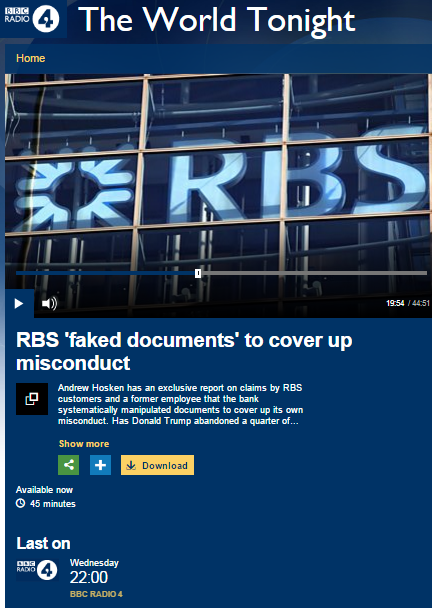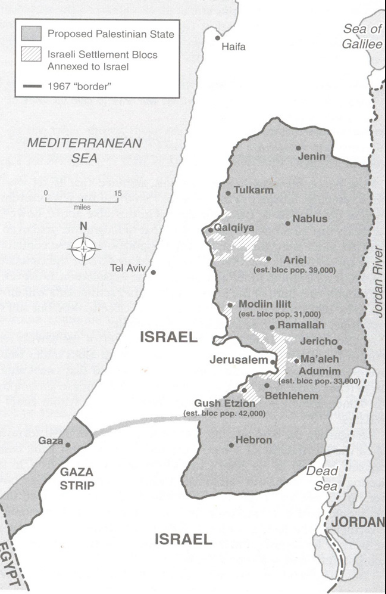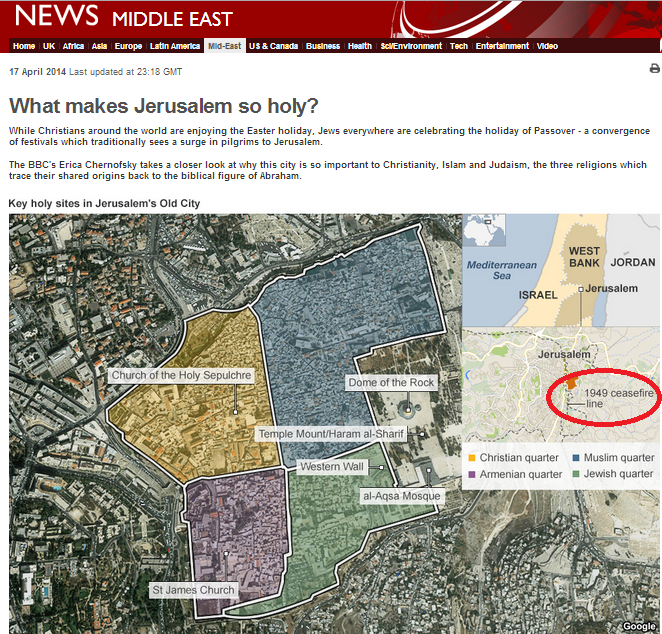The February 15th edition of BBC Radio 4’s ‘The World Tonight’ included an item (from 19:53 here) relating to that day’s meeting between the US president and the Israeli prime minister in Washington.
In that item, presented by Shaun Ley, listeners heard yet another baseless claim of a shift in US policy along with the inaccurate suggestion that the two-state solution formed part of the Oslo Accords. [emphasis added]
Ley: “Now for a quarter of a century a two-state solution to the conflict between Israel and the Palestinians has been the default position of diplomats and politicians alike. It would mean an independent Palestine set up alongside Israel. Tonight at a White House news conference with Israel’s Prime Minister Binyamin Netanyahu, President Trump appeared to tear up what has been the US foreign policy objective under his three most recent predecessors – Democrat and Republican alike.”
Listeners then heard a recording of the US president speaking at that press conference which was apparently intended to support Ley’s claim that Trump had changed US foreign policy.
Trump: “So I’m looking at two-state and one-state and I like the one that both parties like. I’m very happy with the one that both parties like. I can live with either one. I thought for a while that two-state looked like it may be the easier of the two. But honestly, if Bibi and if the Palestinians…if Israel and the Palestinians are happy, I’m happy with the one they like the best.”
Ley continued with what has become a standard BBC theme: promotion of ‘settlements’ as the main obstacle to an agreement, with numerous no less relevant factors such as the Hamas-Fatah split, Hamas’ rejection of the two-state solution or the PA’s refusal to recognise Israel as the Jewish state obscured from audience view.
“Mr Netanyahu certainly received a much warmer welcome here than he had when President Obama was in the White House and he appeared to be enjoying the experience. There was an awkward moment though when, having talked about the need for compromise, the president raised the thorny issue of Israeli settlements: a longstanding obstacle to any deal.”
Another recording from the press conference was then heard.
Trump: “As far as settlements; I’d like to see you hold back on settlements for a little bit. I would like to see a deal being made. I think a deal will be made. I know that every president would like to. Most of them have not started till late because they never thought it was possible. And it wasn’t possible because they didn’t do it. And I think we’re going to make a deal. It might be a bigger and better deal than people in this room even understand.”
Netanyahu: “Let’s try it.”
Trump: “Doesn’t sound too optimistic…good negotiator.”
Netanyahu: “That’s the art of the deal.”
Ley then inaccurately told listeners that Netanyahu’s reply “Let’s try it” related to the topic of settlements rather than to a deal.
Ley: “Well you may just have heard, just before the end of that clip was Mr Netanyahu apparently replying to the challenge over settlements with the words ‘let’s try it’. But on the question of two states or one the Israeli prime minister said too much time over the years had been devoted to labels rather than substance.”
Netanyahu: “So here’s the substance: there are two prerequisites for peace that I laid out several years ago and they haven’t changed. First, the Palestinians must recognise the Jewish state. Second, in any peace agreement Israel must retain the over-riding security control over the entire area west of the Jordan river because if we don’t, we know what will happen.”
Ley: “This evening the Palestinian president Mahmoud Abbas welcomed Donald Trump’s call on Israel to pull back on settlement building and pledged to work with the Americans. Manuel Hassassian leads the Palestinian mission in the UK. He believes President Trump made a terrible mistake.”
Listeners then heard Manuel Hassassian again promote the inaccurate notion that the two-state solution was included in the Oslo Accords. They also heard him make the false claims – completely unchallenged by Shaun Ley – that the 1949 Armistice lines are “borders” and that the definition of the two-state solution is that a Palestinian state would be established on all of the land occupied by Jordan and Egypt in 1948.
Hassassian: “For the last 24 years when we embarked on the peace process, everybody agreed that the two-state solution would be the solution that will end the conflict and end the occupation – meaning that the Palestinian will have a state on the borders of 1967 as a result of the Security Council resolutions 234 and 388. There is a international consensus. International community talking all the time about a two-state solution.”
Seeing as UNSC resolution 388 relates to Rhodesia, Hassassian may have intended to say 338. However, neither UN Security Council resolution 234 nor 338 make any reference to a Palestinian state but Ley failed to challenge Hassassian on that too, continuing:
Ley: “But that consensus has achieved over 25 years next to nothing. Isn’t there an argument that actually on the ground people have long since given up on the idea of a two-state solution because they haven’t seen it…it’s been a convenient parking space for talking. It’s been a way of saying ‘oh look: we have something that we’re aiming for but then we don’t actually have to do anything about it’. Isn’t at least the consequence of this to throw all the pieces up into the air and force people to start talking for real?”
Hassassian: “Yes, the two-state solution and the peace process for the last 24 years have brought nothing except pain and humiliation and suffering for the Palestinian people. We have not seen any breakthrough in this peace process because I think the United States, personally, was not an honest broker of peace and they never really put any pressures on the Israelis to halt settlements. And settlements now are the major impediment to any kind of agreement and a lasting solution.”
Ley’s failure to challenge Manuel Hassassian on the claim that “settlements now are the major impediment” to an agreement is of course unsurprising since he too had made that same claim just minutes earlier, showing the extent to which the BBC has adopted the PLO’s talking points. Similarly failing to ask Hassassian why the PA initiated the second Intifada in 2000, why the PA refuses to recognise Israel as the Jewish state or what the PLO intends to do about Hamas’ refusal to accept the two-state solution, he continued.
Ley: “I mean President Trump did challenge the prime minister on this. He said can you…can you hold off on the settlements for a little bit.”
Hassassian: “Well basically he said it’s a problem but he did not really challenge Netanyahu to stop settlements. Since Clinton administration the US position has always been a two-state solution known [knowing] that the borders will be the 1967 borders.”

That claim too is of course false: the Clinton parameters (which were rejected by the Palestinians) clearly included land swaps and did not advocate a two-state solution based on mythical ‘1967 borders’. Hassassian went on:
“Now this is a dramatic shift in Trump’s policy to look at the peace process as something between two partners that can work out a solution with the blessings of the United States, short of a Palestinian state and more appeasing basic to Netanyahu. And the idea of Trump moving the embassy of the United States to Jerusalem is against international law…”
Ley: “Which he repeated again today. He repeated again today he is considering doing that or looking very seriously at it.”
Hassassian: “If he does that he is just ruining the entire peace process. He is defying the international law and he knows very well that moving the embassy to Jerusalem is a breach to all kinds of agreements; to all UN Security Council, believing that Jerusalem is the united capital – the eternal capital – of the State of Israel. That will dramatically shift the entire game and the entire negotiations and the entire peace process. If he does that, this is a recipe for another intifada or a reaction and he is going to lose partners from the European Union that have adamantly supported the two-state solution when East Jerusalem is considered to be an occupied city. If he does that then there is no role for the United States as a gavel holder or as a shepherd to this entire peace process. He is opening a Pandora’s box of conflicts with the Europeans, with the Islamic world, with the Arab world, with the international community, defying UN Security Council resolutions and where does that leave us?”
Apparently uninterested in Hassassian’s unveiled threats of violence and failing to clarify to listeners that the Quartet – which includes the EU – calls for “a negotiated resolution on the status of Jerusalem”, Ley closed the interview there.
The BBC’s remit includes the priority of enhancing “UK audiences’ awareness and understanding of international issues”. Obviously the inaccurate and misleading claims made by the presenter together with his complete failure to challenge the falsehoods and propaganda promoted by his interviewee did nothing to contribute to meeting that objective.



